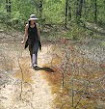I honestly do not know why some plants are even legal to sell and profit from.
Got this in a newsletter today. The bolding's my own.
Longer Marketing Time Increases the Risk of Naturalization by Horticultural Plants - By Stephanie Yao, Agricultural Research Service, USDA. February 24, 2009
"...Unlike previous studies on the invasiveness of horticultural plants, the research team found that the marketing period--the number of years a plant was sold--has profound influence on naturalization and invasion. Seventy percent of plants sold in Florida for 30 years or longer naturalized, according to Pemberton, indicating that length of time sold is the most important factor contributing to naturalization. Non-native plants will continue to naturalize and invade as long as they are sold ..." read moreDetails of this study were recently published in the scientific journal Ecology. ARS is the principal intramural scientific research agency of the U.S. Department of Agriculture.
Recently I copied some plant names from the Invasive Exotic Species Ranking for Southern Ontario and pasted them into the search field of a popular local nursery's on-line catalogue.
Almost every invasive species I looked-up was for sale.
Many are even in multiple cultivars, some up to 8 or even 14, including a few variegated leaf forms. That's a double why to me.
The species include:
- Norway maple Acer platanoides
- Tree of heaven Ailanthus altissima
- Oriental bittersweet Celastrus orbiculatus
- Japanese knotweed Polygonum cuspidatum *
- Common Periwinkle Vinca Minor
- White mulberry Morus alba L.
- Tatarian honeysuckle Lonicera tatarica L.
- Glossy buckthorn Rhamnus frangula
- Japanese honeysuckle Lonicera japonica
- Amur honeysuckle Lonicera maackii
- Multiflora rose Rosa multiflora
- European birch Betula pendula
- Winged Euonymus Euonymus alatus
- Autumn olive Elaeagnus umbellate
- Flowering rush Butomus umbellatus
- European frog-bit Hydrocharis morsus-ranae
- Rough manna grass Glyceria maxima
- Black alder Alnus glutinosa
- Phragmites / common reed Phragmites australis
* some one near and dear actually bought one one of the Japanese Knotweeds. "Isn't it pretty? I've never even HEARD of it before!" and then she asked me to plant it for her. "I don't think that would be a good idea," i said and suggested she go in and look up that species on-line. She came back out an hour later and said "WHY would they even this sell this to me?!" "Because they know you will buy it. And they know most people have been persuaded to believe that their own connection with the natural world is so severed that they should "always ask for" and defer to professional advice, and we assume that -- because they bought expensive "certified" memberships to hort associations, or had training in well-known programs in our schools -- we can trust them not to do something this stupid.
Why are these plants even legal to sell and profit from here, when we demand that our taxes, government and non-profit resources spend time and money trying to control the exact same species?
We spend money and time on invasives: control, eradication, monitoring, impacts, public education, and on restoring and acquiring conservation lands that we must perpetually defend. But we won't out law one of their largest known sources.
I'm sick of the traditional hort and gardening industry. I haven' t been able to rationalize it for a long time, but now I can't even find reasons to tolerate it (this blog has links to a raft of alternatives, for consumers and the people who are employed by the hort industry too). I'm sick of the racket: grow easy invasive hort plants -> hype invasive plants with awards and press releases and big garden shows: charge people to read or see this hype-> sell invasive plant to client for money -> sell client unnecessary fertilizer for plant -> fertilizer mysteriously destroys soil and client must come back for more fertilizer -> watch plant grow... and spread, and cause misery -> customer must come back for weed removal advice, tools, herbicide, possibly labour, and buy more "new" award winning plants (maybe some patented plant that doesn't spread, or even seed anymore, which is about as useful as sculpture to local insects) to fill the new hole in their yard. I know that a lot of people, be as a result of education or legislation, are taking out some of the steps like salt-based fertilizers and cosmetic pesticides, or peat moss for that matter, but the rest of the cycle still remains.
And BTW I’m not trying to single-out a specific nursery. I'm sure it's the same at almost all conventional nurseries and garden centres. In fact, that particular nursery actually sells some ethically propagated native plants. Not that I will buy from them anymore, or from any nursery who will not stop selling invasives. Not a pot, a shovel, a trellis, a hose, a book, a rake, pruning tools... anything.
How can I support any business that perpetuates the spread of well-known invasive plants? Why would I spend money supporting invasive plant culture when invasives steal my natural heritage, a lot of my time, break my back and lay waste to living things and places I love?


No comments:
Post a Comment